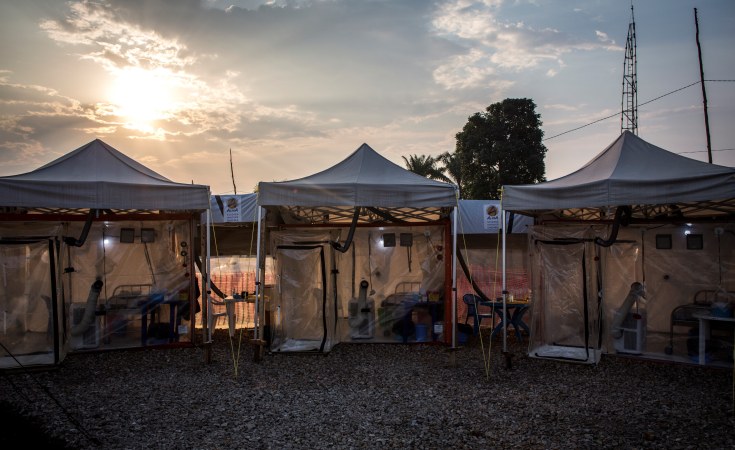A Congolese clinician's frustration at being unable to give Ebola patients the quality of care they deserved has led to a ground-breaking innovation which revolutionises the treatment of patients with highly infectious diseases in areas with few resources.
When Dr. Richard Kojan, an intensive care unit (ICU) specialist, went to Guinea during the 2014 Ebola oubreak, he was forced to work in hot and cumbersome protective clothing which looked like a spacesuit, isolating him from his patients and limiting his interaction with them.
"It was impossible to monitor a patient properly," he tells AllAfrica. "It was impossible to stay with a patient for long enough. It was impossible for a patient to see his or her doctor or nurse properly. It was very complicated."
So when Dr. Kojan and a team from the Alliance for International Medical Action (ALIMA), the NGO for which they worked, finished their stint in Guinea, they studied how hospitals in Europe treated patients with highly infectious diseases.
They found that patients treated in Africa were seven times more likely to die than those in Europe.
"The mortality rate of patients treated for Ebola in Africa was 65 to 70 percent," says Augustin Augier, the founder and chief executive officer of ALIMA. "At the same time people treated in Western countries for the very same disease had a mortality rate of less than 10 percent."
The solution ALIMA hit upon was to flip the practice of enclosing medical staff in protective gear, and to place patients behind a protective shield.
Working with a French company, Securotec, ALIMA developed "the CUBE", a stand-alone treatment room with transparent plastic walls in which an individual patient can be isolated and continuously monitored and treated from the outside. (CUBE is the acronym for the French name of the innovation, Chambre d'Urgence Biosécurisée pour Epidémies, or Biosecure Emergency Care Units for Outbreaks.)
Dr. Kojan told AllAfrica: "With the CUBE, it becomes possible to introduce a standard of care comparable with that in hospitals in Europe. For example, we have good monitoring for blood pressure, respiration, we can check renal function and check lung function.
"Before the CUBE, your patient could not see your face, the patient could not see who is the doctor, who is the nurse, who is the hygienist. Now with the CUBE, I can meet the patient, I can stay with the patient, and the patient can see me."
Most treatment can be administered from outside, without fear of contamination, with medical staff able to access their patients through plastic sleeves built into the CUBE. But doctors can also step into the room in protective gear to perform emergency surgeries - for example, caesarian sections for pregnant women.
The CUBE not only enables medical staff to provide more intensive care to patients; it can boost patient morale, thus improving chances of recovery.
During the West African Ebola crisis, patients were confined to remote, dormitory-like treatment centres, cutting them off from relatives and friends and creating uncertainty and fear in the communities from which they came. In contrast, the CUBE can be placed in hospitals within communities, where patients can receive visits from their families and other residents can see them being treated.
"The patient can see his family, they can meet, they can talk. That changes the lives of the patients... and of the community. The family can help us to support the patient – psychologically, that's a great thing," adds Dr. Kojan.
Moreover, the new innovation saves time and money. ALIMA says the nine-metre-square CUBE can be set up in 90 minutes, whereas dormitory-style treatment centres took six weeks to build. Weighing 290 kilograms, a CUBE can be deployed quickly by helicopter or in a small vehicle over rough roads. ALIMA estimates that the innovation cuts the cost of medical interventions by 75 percent.
The CUBE is being used successfully in the Democratic of Congo, where 30 units have been deployed to help treat victims of the Ebola outbreak there. ALIMA has emergency stock in case of more outbreaks, says Augustin Augier.
Based in Dakar, ALIMA is a humanitarian relief organisation which combines healthcare, research and local capacity-building to support those who are most vulnerable to health emergencies. In November Dr. Kojan, who is president of ALIMA, was named a "game-changing innovator" and presented with a REACH (Recognizing Excellence Around Champions of Health) award.


